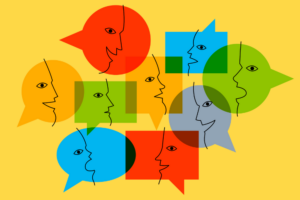“Me gusta la fruta” (“I like fruit”) or how political discourses have changed
As journalists and communicators, we have always been passionate about witnessing renowned campaigns in practice, especially in the political sphere.
Political campaigns have existed since time immemorial, with political communication being the common factor in all of them. Let’s start with the theory. What is political communication? In its strictest definition, it encompasses a set of strategies and techniques used by political actors to convey their messages. This includes everything from verbal communication, of course, to non-verbal communication (gestures, looks, dress codes, etc.), and nowadays, marketing. Every detail is important and can influence the opinions of others and their consequent decision-making.
Throughout history, there are references that cannot be overlooked when discussing successful campaigns, from Martin Luther King and Nelson Mandela (not forgetting Gandhi) to the successful Barak Obama’s 2008 campaign. Today we can also find examples that, although probably not as remarkable, are quite creative. Today, for example, the political news has left us with Isabel Díaz Ayuso’s speech, which does not leave us indifferent.
Historical political campaigns
In the case of Martin Luther King, the most notable aspect of his entire political communication campaign was that he always spoke from the heart. He genuinely believed in what he said, and that is transmitted. His campaign was linked to equality and the fight against racism in an American society that was deeply racist. How can one fight against such a deeply rooted culture in society? By playing with the emotions of those who listen to your speech and being absolutely convinced of what you say, as he demonstrated in his speech on August 28, 1963, in Washington, “I had a dream“:
This message is repeated several times throughout his speech, which, by the way, was well-rehearsed and improved from previous occasions to deeply resonate with the message’s recipients. It leaves us with a great lesson: the preparation and rehearsal of speeches are also fundamental, in addition to being able to convey messages from the heart and emphasizing those that we want to resonate more deeply with the audience.
“The preparation and rehearsal of speeches are also fundamental.”
And Nelson Mandela also spoke from the heart, who was elected president in 1994 by more than 12 million voters, representing almost 65% of the African population, and an unprecedented success. Of politicians like Mandela, his profound values stand out (something that is perhaps lacking in our current politicians), values that he also knew how to transmit to the people through his speech, basing his campaign on pacifism and also, like Luther King, on the fight against racism… His messages of peace went around the world and reached the majority of the population, regardless of their colour or social class. From Mandela, we can extract another great slogan in the history of communication: “Education is the most powerful weapon you can use to change the world.”
And from here arises another lesson: it is not about manipulating your listeners but about educating them to have their own opinions and decision-making abilities (in other words, the opposite of dictatorships).
“It is not about manipulating your listeners but about educating them to have their own opinions and decision-making abilities.”
To come closer to the present day, we cannot fail to highlight Barak Obama’s 2008 campaign, which undoubtedly marked a before and after for current political communication, as he became the first 2.0 politician to use social networks as the basis of his project. People and the internet: the main assets in any self-respecting marketing campaign today, were the basis of Obama’s unprecedented success, according to experts in digital politics.
Furthermore, Obama’s campaign is not only notable for its impeccable use of social networks, especially Facebook and Twitter, to reach young people (as well as its support of influencers and celebrities), but his team was also able to create one of the best slogans in the history of politics: Yes, we can.
All this, along with the support of the best advisors and the naturalness and closeness that characterize Obama, led him to win the elections twice. In all these cases,
it was not just about convincing an electorate and winning elections, but their campaigns went beyond that. It was about conveying an idea and changing society. They are clear examples that the power of communication knows no limits.
The current scenario of political communication
But let’s not only talk about successful campaigns carried out from the heart. What’s happening now?
As Charo Toscano, a consultant in political communication with artificial intelligence, asserts, there are things that never change in this field, with electoral campaigns being almost a ritual for political parties.
Large teams of advisors, completely orchestrated strategies, and well-defined messages are currently complemented by transmedia communication, supported by new digital formats. Innovation, the use of influencers, support in visual content, or even the use of AI (to index digital content automatically) are the order of the day.
So, with all these opportunities, what is happening nowadays? Where have the political slogans of yesteryear and the messages capable of changing society gone? I sincerely believe that we have reached a moment of complete distrust in what we read, see, or hear. We constantly have to verify whether the information we receive is true or fake news. The world of communication is polluted and manipulated, and therefore, could we say that emotional communication that resonated with people has died to give way to a more rational communication?
This could probably be the key to what the audience is looking for nowadays: fewer emotional speeches and more truths because, at this point, even the senders, the politicians, may not believe in their messages (and may prioritize their interests over those of society).
I leave the end of this brief reflection open to hear your opinion. With all the resources we have today, what do current politicians lack for their messages to resonate as they did before?












